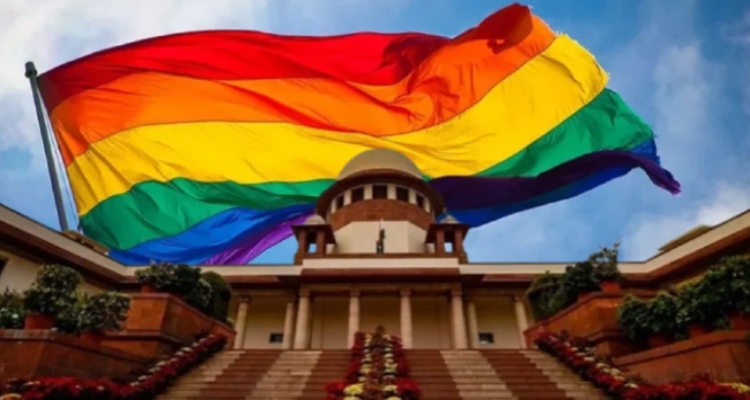
The Supreme Court on Tuesday denied a request for an open court hearing of pleas seeking a review of its judgment from last year, which declined legal recognition for same-sex marriage.
On October 17, last year, a constitution bench led by Chief Justice of India D Y Chandrachud rejected legal backing for same-sex marriage, stating that there was “no unqualified right” to marriage except those recognized by law.
However, the apex court had advocated strongly for the rights of queer individuals, ensuring they do not face discrimination in accessing goods and services. It also called for the establishment of safe houses known as ‘Garima Greh’ in all districts to provide shelter to community members facing harassment and violence, and dedicated hotline numbers for those in trouble.
Review Petitions
A five-judge bench, comprising Chief Justice of India (CJI) D Y Chandrachud and Justices Sanjiv Khanna, Hima Kohli, B V Nagarathna, and P S Narasimha, is scheduled to consider in chambers the pleas seeking a review of the judgment on July 10.
Senior advocates Abhishek Singhvi and N K Kaul mentioned the matter and urged the CJI to hear the review petitions in an open court. “I say that if these petitions can be heard in the open court…,” Kaul asked the court. The CJI responded, “These are the constitution bench review matters which are listed in chambers.”
According to practice, review pleas are considered in chambers by judges. In its judgment, the bench had held that transgender people in heterosexual relationships have the freedom and entitlement to marry under existing statutory provisions. It stated that an entitlement to legal recognition of the right to union, similar to marriage or civil union, or conferring legal status to the relationship, can only be achieved through “enacted law.”
‘No Legal Recognition’
The five-judge constitution bench headed by CJI Chandrachud had delivered four separate verdicts on a batch of 21 petitions seeking legal sanction for same-sex marriages. All five judges were unanimous in refusing to grant legal recognition to same-sex marriage under the Special Marriage Act and observed that it is within Parliament’s authority to amend the law to validate such unions.
The CJI wrote a separate 247-page verdict, while Justice Sanjay Kishan Kaul (since retired) penned a 17-page judgment broadly agreeing with Justice Chandrachud’s views. Justice S Ravindra Bhat (since retired), who authored an 89-page judgment for himself and Justice Hima Kohli, disagreed with certain conclusions reached by the CJI, including the applicability of adoption rules for queer couples. Justice P S Narasimha, in his 13-page verdict, stated that he fully agreed with Justice Bhat’s reasoning and conclusions.
The judges were unanimous in recognizing that queerness is a natural phenomenon and not an “urban or elite” occurrence. In his judgment, the CJI noted the assurance by Solicitor General Tushar Mehta that the Centre would constitute a committee chaired by the cabinet secretary to define and elucidate the entitlements of queer couples in union.
Long Way to Go
LGBTQIA rights activists, who won a significant legal battle in 2018 when the Supreme Court decriminalized consensual gay sex, had moved the apex court seeking validation of same-sex marriage and related reliefs such as adoption rights, enrollment as parents in schools, opening bank accounts, and availing succession and insurance benefits. Some petitioners urged the Supreme Court to use its plenary power, “prestige and moral authority” to push society to recognize such unions, ensuring that LGBTQIA individuals can lead a “dignified” life like heterosexuals.
LGBTQIA stands for lesbian, gay, bisexual, transgender, queer, questioning, intersex, pansexual, two-spirit, asexual, and allied persons.




